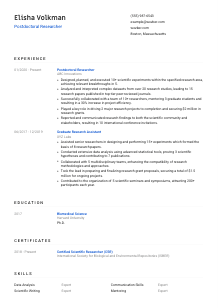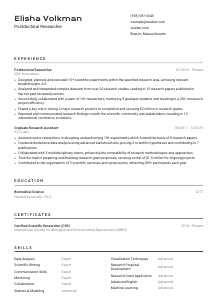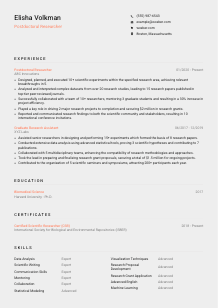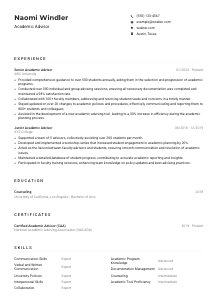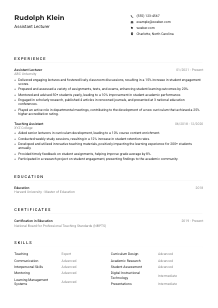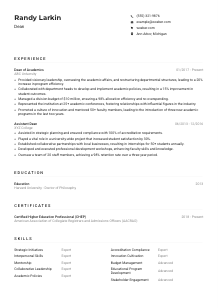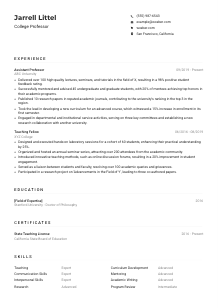Postdoctoral Researcher Resume Example
Delving into experiments, but your resume seems theoretical? Explore this Postdoctoral Researcher resume example, formulated with Wozber free resume builder. See how effortlessly you can present your scientific finesse to align with career criteria, assuring your research journey stays as vibrant as the molecules you study!
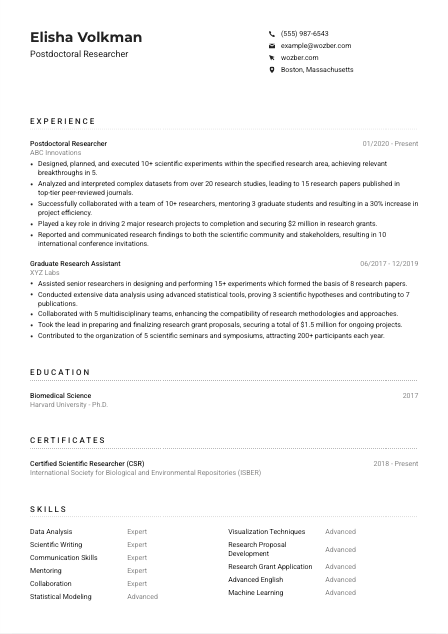
How to write a Postdoctoral Researcher Resume?
As you stand at the threshold of your next big role in the world of research, your resume is the key that can unlock doors to endless possibilities. The quest for the perfect Postdoctoral Researcher position is beyond a mere job search; it's your opportunity to make a significant impact in your field. With Wozber's free resume builder at your side, crafting an ATS-compliant resume tailored to your dream job is not only achievable but also a chance to reflect on your achievements.
This guide is tailored specifically for the Postdoctoral Researcher role, filled with industry-specific insights to help you weave an engaging narrative of your research journey.
Personal Details
The 'Personal Details' section of your resume is where the journey begins. It might seem straightforward, but it's your first handshake with the hiring manager. Let's fine-tune this section to ensure your introduction stands out, especially when applying for the Postdoctoral Researcher position.
1. Name and Title
Your name is the marquee on your professional theater; let it shine clearly at the top. Following your name, the job title you're applying for, "Postdoctoral Researcher", immediately signals to the hiring manager that your application is tailored and focused. It's these little details that make a big difference.
2. Contact Essentials
Your contact information is the bridge for potential employers to reach you. A professional email (think firstname.lastname@email.com) and a contact number where you are readily available are essentials. Errors here are not an option, so triple-check every digit and letter.
3. Location Precision
Mentioning "Boston, Massachusetts" directly aligns with the job requirement, subtly reassuring the employer of your logistical suitability for the role. This specificity eliminates any guesswork regarding relocation.
4. Professional Online Presence
In today's digital age, including a LinkedIn profile or a personal website showcasing your research portfolio can be a game-changer. Ensure it's updated and mirrors the achievements and skills highlighted on your resume.
5. The Essential Edit
Exclude personal details like age or marital status that can give rise to unconscious bias. In the science community, let your research and accomplishments speak for themselves.
Takeaway
Perfecting your Personal Details is about ensuring that the first impression is not only professional but perfectly aligned with the Postdoctoral Researcher role. Think of it as laying down the red carpet for the rest of your resume.





Experience
The 'Experience' section is where you get to shine a spotlight on your journey in the realm of research. Tailoring this section to reflect precisely what hiring managers are looking for in a Postdoctoral Researcher will set you apart from the competition. Let's map out how to transform your experiences into a narrative of success.
- Designed, planned, and executed 10+ scientific experiments within the specified research area, achieving relevant breakthroughs in 5.
- Analyzed and interpreted complex datasets from over 20 research studies, leading to 15 research papers published in top‑tier peer‑reviewed journals.
- Successfully collaborated with a team of 10+ researchers, mentoring 3 graduate students and resulting in a 30% increase in project efficiency.
- Played a key role in driving 2 major research projects to completion and securing $2 million in research grants.
- Reported and communicated research findings to both the scientific community and stakeholders, resulting in 10 international conference invitations.
- Assisted senior researchers in designing and performing 15+ experiments which formed the basis of 8 research papers.
- Conducted extensive data analysis using advanced statistical tools, proving 3 scientific hypotheses and contributing to 7 publications.
- Collaborated with 5 multidisciplinary teams, enhancing the compatibility of research methodologies and approaches.
- Took the lead in preparing and finalizing research grant proposals, securing a total of $1.5 million for ongoing projects.
- Contributed to the organization of 5 scientific seminars and symposiums, attracting 200+ participants each year.
1. Dissect the Requirements
carefully dissect the job posting, extract each nugget of expectation like 'design, plan, and execute experiments' and reflect on how your past roles have prepared you for these tasks. Every bullet point in your experience section should resonate with these core responsibilities.
2. Role and Place Highlight
Structure your experiences starting with your most recent role, ensuring to include the position title, company name, and the duration of your tenure. This clarity builds a timeline of your growing expertise.
3. Achievement Narration
Transform your responsibilities into compelling accomplishments. Instead of merely listing tasks, showcase outcomes like securing $2 million in research grants or leading breakthrough experiments. Quantify your successes to make them more impactful.
4. Relevance is Key
While it might be tempting to list all your experiences, focus on those directly relevant to being a Postdoctoral Researcher. Highlight roles where you've demonstrated proficiency in data analysis, contributed to peer-reviewed publications, or executed significant research projects.
5. The Quantitative Edge
Whenever possible, use numbers to quantify your achievements, be it through secured grants, the number of experiments designed, or publications contributed to. This not only provides concrete evidence of your contributions but also paints a picture of your potential impact.
Takeaway
Crafting an impressive experience section is about narrating your journey through numbers, impacts, and innovations. Demonstrate how your past roles have sculpted you into the ideal candidate for the Postdoctoral Researcher position and let your success stories lay the foundation for your next big leap.
Education
In science, your educational background is not just a testament to your knowledge but a cornerstone of your credibility. Aligning your education section with the expectations for a Postdoctoral Researcher role is essential. Here's how you can ensure this section underscores your qualifications.
1. Highlight Required Degrees
Clearly, state your highest qualification first, emphasizing the relevant field of study that matches the job description. Your Ph.D. in a relevant field, for example, 'Biomedical Science', directly hits the mark set by the job posting.
2. Organize with Clarity
Present your educational journey in reverse chronological order. Ensure each entry includes the degree, the field of study, the institution, and the year of completion. This structure makes it easy for hiring managers to verify your qualifications at a glance.
3. Tailor Content
For a role as focused as Postdoctoral Researcher, optimize this section by listing degrees that directly align with the specified research area. This is not just about listing your qualifications; it's about showcasing their relevance.
4. Showcase Relevant Achievements
If you've received accolades, participated in clubs or societies relevant to your field, or completed impactful projects or thesis work, mention these. They add another layer of depth to your academic excellence.
5. Keep It Lean
While it's crucial to showcase your academic credentials, remember to keep this section concise. Focus on the qualifications that matter most to the role of Postdoctoral Researcher and leave out the rest.
Takeaway
Your education section is more than just a list of degrees; it's a narrative of your academic journey and its relevance to your future role. Ensure it's polished, precise, and indicative of your suitability for the prestigious position of a Postdoctoral Researcher.
Certificates
In the ever-evolving field of research, continuing your professional development through certifications can highlight your dedication to staying ahead. While the job may not list specific certifications, selecting those that enhance your application for a Postdoctoral Researcher role is key.
1. Reflect on Relevance
Start by reviewing the job description for any suggested or required certifications. If none are mentioned, consider certifications that demonstrate your proficiency in vital skills like data analysis or statistical modeling. Even if not required, they add weight to your resume.
2. Highlight Pivotal Certifications
Select certifications that are most relevant to the Postdoctoral Researcher role. This could include anything from advanced statistical analysis programs to specialized research methodologies. The key is to show that you are not just qualified but highly skilled.
3. Date and Detail
For each certificate, include the issuing body and the date of achievement. This not only validates your claim but also shows your continuous commitment to professional development.
4. Embrace Lifelong Learning
The research field is dynamic, requiring constant learning and adaptation. Your pursuit of certifications shows a proactive attitude towards growth and learning. This eagerness to evolve is a desirable trait in any Postdoctoral Researcher.
Takeaway
While certifications might be the cherry on top, not the cake itself, they signify your commitment to growth and excellence in your field. Choose wisely and position them as evidence of your ongoing journey in research.
Skills
In the competitive arena of postdoctoral research, your skill set is your greatest asset. An adeptly crafted 'Skills' section not only showcases your competencies but also aligns them with the job's requirements. Let's pinpoint how to select and present your skills for maximum impact in applying for a Postdoctoral Researcher role.
1. Extract and Align
Comb through the job description to identify both hard and soft skills that are emphasized. Skills like 'data analysis', 'scientific writing', and 'communication skills' are not just words but pivotal tools of your trade. Ensure these are prominently featured on your resume.
2. Prioritize Pertinence
While listing your skills, prioritize those that directly align with the job requirements. This demonstrates to the hiring manager at a glance that you possess the specific capabilities they are seeking.
3. Organize and Optimize
Organize your skills in a manner that emphasizes your strongest points first. Using an ATS-friendly resume format ensures that your resume passes through any initial screenings, making your key skills immediately visible to the hiring manager.
Takeaway
Your 'Skills' section is a powerful summary of your professional toolkit. Tailor it meticulously to the Postdoctoral Researcher role, ensuring each skill listed is a testament to your readiness and capability to excel in the position.
Languages
In the diverse world of research, being multilingual can be a considerable asset, broadening your collaboration horizons and enhancing your ability to disseminate findings globally. Let's explore how to illuminate this section to showcase your linguistic capabilities fittingly for a Postdoctoral Researcher role.
1. Job Description Clues
Firstly, identify if the role specifically requires or prefers certain languages. For a Postdoctoral Researcher, excellent English proficiency is a must, as indicated by the job description. Start with this and then list any additional languages.
2. Prioritize and Profess
List languages starting with the one most relevant to the job, noting your proficiency level. Being 'Fluent' or 'Native' in English is crucial for this role, followed by other languages which can highlight your versatility.
3. Additional Linguistic Assets
Even if not explicitly required, additional languages can underscore your ability to collaborate internationally or work on global projects. It's an indicator of your capacity to navigate a multicultural research environment.
4. Honesty in Proficiency
Accurately represent your language skills. Overestimating your proficiency could lead to awkward situations, especially in a profession where clear communication is key.
5. The Global Researcher
For roles that might involve international collaboration or publications, showcasing your language skills can significantly bolster your candidacy. It tells potential employers that you're equipped to engage with the international scientific community.
Takeaway
While your research and technical skills take center stage, don't underestimate the value of your linguistic abilities. In a globally connected world, being multilingual can significantly widen your research impact and collaboration opportunities.
Summary
Your resume summary is where you distill your research odyssey into a compelling narrative. This concise introduction is crucial for grabbing the hiring manager's attention. Tailor it to highlight your fit for the Postdoctoral Researcher position, showcasing your unique contributions to the research realm.
1. Capture the Essence
Begin by succinctly stating your professional identity and area of expertise. For a Postdoctoral Researcher role, highlight your years of experience, your domain of research, and your knack for leading projects and collaborations.
2. Spotlight Key Accomplishments
Mention your notable achievements, such as significant publications, research grants secured, or groundbreaking experiments. These highlights not only speak to your credentials but also to your potential to contribute to future projects.
3. Precision Over Prolixity
Keep your summary tight and on point. Directly address how your expertise aligns with the job requirements, ensuring each word contributes to a picture of you as the ideal candidate.
4. The Teaser
Consider your summary as the teaser to the exciting story of your professional journey. It should intrigue the hiring manager enough to delve deeper into your resume, eager to discover the breadth and depth of your experiences and achievements.
Takeaway
A well-crafted summary acts as the opening act to the narrative of your resume, setting the stage for a deeper exploration of your qualifications. Let it mirror the confidence and promise of your research career, compelling the hiring manager to consider you as the prime candidate for the Postdoctoral Researcher role.
Embarking Your Research Journey With Confidence
Congratulations on crafting a resume that not only meets the criteria for a Postdoctoral Researcher position but shines with your personal brand of brilliance. With a tailored resume in hand, you're ready to step into the world of cutting-edge research. Remember, your resume is your story, intricately woven with the threads of your achievements, skills, and aspirations. Let Wozber's free resume builder, including its ATS-friendly resume templates and ATS resume scanner, guide you to not just meet but exceed the expectations of hiring managers.
Go forth, with the knowledge that you have the tools to turn your next job application into the gateway to your dream role. The future is bright, and it awaits your discoveries.

- Ph.D. in a relevant field of study with a focus on the specified research area.
- Demonstrated proficiency in data analysis, statistical modeling, and visualization techniques.
- Strong publication record in peer-reviewed journals and an ability to lead or contribute to research proposals.
- Exceptional interpersonal and communication skills to collaborate effectively with multidisciplinary teams.
- Minimum of 2 years of postdoctoral or relevant research experience.
- Advanced English language skills needed.
- Must be located in Boston, Massachusetts.
- Design, plan, and execute experiments or studies within the research area.
- Analyze, interpret, and report research findings to the scientific community and stakeholders.
- Collaborate with team members, mentors, and external partners to drive research projects and objectives.
- Contribute to the development and submission of research grants and funding applications.
- Mentor and supervise graduate or undergraduate students as necessary.





